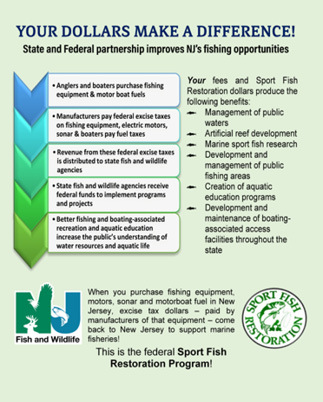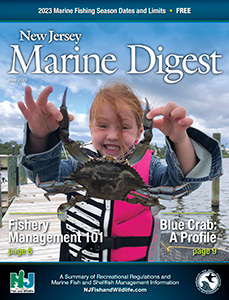New Jersey Division of Fish & Wildlife
State of New Jersey
Philip D. Murphy, Governor
Sheila Y. Oliver, Lieutenant Governor
Department of Environmental Protection
Shawn LaTourette, Commissioner
New Jersey DEP Fish & Wildlife
Dave Golden, Assistant Commissioner
Lisa Barno, Administrator, Species and Habitat Conservation
Joe Cimino, Administrator, Marine Resources Administration
Ginger Kopkash, Administrator, Communications and Business Administration
Russ Babb, Chief, Marine Habitat and Shellfisheries
Jeff Brust, Chief, Marine Fisheries
Shawn Crouse, Chief, Freshwater Fisheries
Jason Hearon, Chief, Land Management
Al Ivany, Chief, Information and Education
Frank Panico, Chief, Conservation Police
Carole Stanko, Chief, Wildlife Management
Kathy Clark, Acting Chief, Endangered and Nongame Species
Kim Springer, Chief, Business Administration
Linda DiPiano & Alanna Newmark, Co-Editors
NJDEP Fish & Wildlife is a professional, environmental organization dedicated to the protection, management and wise use of the state’s fish and wildlife resources.
The Digest is available at coastal license agents, bait and tackle shops and NJ Fish & Wildlife offices. Information may be reprinted with permission. Subscriptions are not available.
This Digest is designed and produced by J.F. Griffin Publishing, LLC; www.jfgriffin.com.
Partial funding for the Digest is provided by the Federal Aid in Sport Fish Restoration Program.
Cover photo: Six-year-old Emma Brennan, showing her passion for crabbing on Beaver Dam Creek in Brick, NJ. Photographer Tim Brennan, Brick School District HOFNOD Team Leader.
New Jersey Fish and Wildlife Councils
Marine Fisheries Council
Richard N. Herb, Acting Chair
Dr. Eleanor Ann Bochenek
Dr. Patrick Donnelly
Warren (Barney) Hollinger
Walter L. Johnson III
Jeff Kaelin
Joe Rizzo
Robert R. Rush, Jr.
Kevin Wark
To contact any member of the Marine Fisheries Council, please email [email protected]
Atlantic Coast Shellfish Council
Walter L. Johnson, III, Chair
George Mathis, Jr., Vice Chair
Paul Felder
Delaware Bay Shellfish Council
Warren (Barney) Hollinger, Chair
Stephen J. Fleetwood, Vice Chair
Richard Malinowski
Scott Sheppard
Where to Write Us
New Jersey Department of Environmental Protection, Fish & Wildlife
MC 501-03 • P.O. Box 420 • Trenton, NJ 08625-0420 • NJFishandWildlife.com
May 21, 2023
Island Beach State Park, Seaside Park, NJ
Enjoy a great day of surf fishing with family and friends at the Governor's Surf Fishing Tournament.
The individual who catches the overall largest fish wins the "Governor's Award" and will have their name engraved on the Governor's Cup, which is permanently displayed at Island Beach State Park. Prizes are awarded to winners in a variety of age group and fish species categories.
All funds raised by the tournament go toward improving beach access, surf fishing instruction programs and equipment, plus marine education and restoration projects.
The tournament is sponsored by NJDEP’s Fish & Wildlife and Division of Parks, Forestry and Historic Places, New Jersey State Federation of Sportsmen’s Clubs, Jersey Coast Anglers Association and New Jersey Beach Buggy Association.
For more information visit: dep.nj.gov/njfw/fishing/marine/governors-surf-fishing-tournament/ or email [email protected].

Operation Game Thief
Report Abuse of our Outdoor Heritage!
1-855-OGT-TIPS
24 Hours a Day, Seven Days a Week
The person who poaches, pollutes habitat and abuses public land tarnishes the image of sportsmen and robs us of our fish and wildlife as well as tax and license dollars. You can make a difference.
Call OGT to report:
- Negligent use of firearms
- Over the limits for game and fish
- Commercial exploitation of fish and wildlife
- Pollution of habitat, dumping on state land
- Destruction of signs and state property
- Illegal killing, taking or possession of any wildlife
It's Free. It's Confidential.
You May Be Eligible for a Reward.
Funded by the New Jersey State Federation of Sportsmen's Clubs.
Designed to encourage sportsmen to report poaching and wildlife crimes.
Operation Game Thief — Undersized Blue Crabs
In August 2022, the Operation Game Thief tip line received a report of a person keeping undersized blue crabs on the Fair Haven Municipal Dock. Conservation Police Officer Dane Bahrle located the crabber, who matched the description, given by the caller. An inspection of their cooler found 42 blue crabs under the 4 ½ inch legal size limit. The infraction cost the violator $30 per crab plus court fees.
Calls to (855) OGT-TIPS can be about any violation of NJ’s laws protecting wildlife. Through the Operation Game Thief program, you can help NJ’s Conservation Police Officers defend our living natural resources, and if the information you provide results in a conviction, you may earn a reward too.
Operation Game Thief: (855) OGT-TIPS
Accessible Fishing Sites
For people with disabilities, visit: dep.nj.gov/njfw/wp-content/
An Accessible Fishing Sites list is available to assist anglers whose mobility is impaired.
All sites are wheelchair-accessible except for the Musconetcong River in Morris County, where vehicle access is to the shoreline.
Conservation Police and Regulation Information
Contact a NJDEP Fish & Wildlife Conservation Police office that serves the county where you hunt or fish.
- Northern Region — (908) 735-8240
(Bergen, Essex, Hudson, Hunterdon, Morris, Passaic, Somerset, Sussex, Union and Warren counties) - Central Region — (609) 259-2120
(Burlington, Mercer, Middlesex, Monmouth and Ocean counties) - Southern Region — (856) 629-0555
(Atlantic, Camden, Cape May, Cumberland, Gloucester and Salem counties) - Marine Region — (609) 748-2050
(coastal and bay areas) - To report violations anonymously
call Operation Game Thief —
(855) OGT-TIPS
To protect and manage the state’s fish and wildlife to maximize their long-term biological, recreational and economic value for all New Jerseyans.
Our Goals
- To maintain New Jersey’s rich variety of fish and wildlife species at stable, healthy levels and to protect and enhance the many habitats on which they depend.
- To educate New Jerseyans on the values and needs of our fish and wildlife and to foster a positive human/wildlife co-existence.
- To maximize the recreational and commercial use of New Jersey’s fish and wildlife for both present and future generations.
Federal Recreational Fishing Regulations
For current federal waters regulations (3–200 nautical miles), refer to the following agencies:
- NOAA Atlantic Highly Migratory Species (HMS) Information:
fisheries.noaa.gov/topic/atlantic-highly-migratory-species - NOAA Atlantic Highly Migratory Species (HMS) Permit Shop:
hmspermits.noaa.gov/ - Mid-Atlantic Fishery Management Council:
mafmc.org/regulations - South Atlantic Fishery Management Council:
safmc.net/regulations/

NEW NJDEP Fish & Wildlife Website
Visit the NJ Fish & Wildlife Website to access saltwater fishing regulations, management updates, public hearing information, data collected from field surveys and more:


Attention Boaters
Keep Our Water Clean— Use Pumpouts
Ready To Serve Boaters! Visit marina pumpout facilities or contact one of the pumpout boats. A complete listing of operational pumpout facilities at marinas and detailed information on the pumpout boats can be found at NJBoating.org.
Proper maintenance and operation of your on-board toilet and holding tank are critical to ensure they function properly.
- Always use sufficient water when flushing
- Use toilet paper designed for use in marine/RV systems
- Have your marina inspect your onboard toilet system to make sure it is operating properly
Tips for Releasing Fish Unharmed
Proper handling and releasing techniques reduce fish mortality.
- Land fish quickly, except when retrieving from depths of 40-feet or more. Fighting a fish to exhaustion increases mortality as does rapidly bringing fish up through the changing water pressure and temperature gradients.
- Minimize the effect of barotrauma, which occurs when gases expand faster than they can diffuse due to decreasing pressure during ascent through the water column. For more information about barotrauma and how to release fish safely visit: fisheries.noaa.gov/national/resources-fishing/catch-and-release-best-practices.
- Keep fish to be released in the water as much as possible. Plan ahead with tools and camera.
- Minimize physical injury. Do not touch gills or eyes. Support the weight of the fish along the length of its body. Do not allow fish to flop around on deck.
- Carefully remove hooks using a dehooker or needle-nose pliers.
- Use plain hooks, not stainless, which rust away quickly if one must be left in a
gut-hooked fish. Be prepared with a long-reach tool to cut the leader at the hook, close to the hook’s eyelet. - To bring a fish out of the water momentarily, use a neoprene net or one of knotless nylon. Handle the fish carefully using wet hands, wet cotton gloves or similar material to minimize loss of the fish’s protective slime layer.
- To revive lethargic fish, hold in a normal, upright position. Move the fish forward in an “S” or
figure-8 pattern so that water flows over the gills only from front to back. - Use circle hooks (non-offset) for species that bite and flee, such as striped bass, weakfish or sea bass. Consider pinching hook barbs with pliers.

